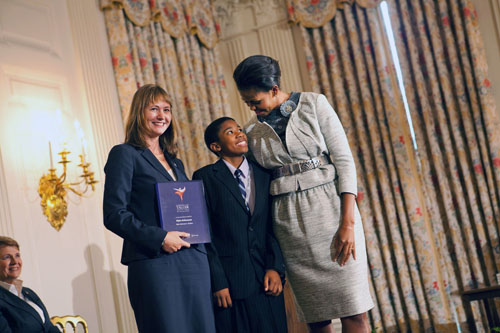
Yesterday afternoon in the historic State Dining Room, First Lady Michelle Obama, honorary chair of the President's Committee on Arts and Humanities, presented 15 programs from around the world with the Coming Up Taller Award. Given to arts and humanities organizations that reach underserved youth, the award is a reminder of the meaningful role cultural activities play in the lives of our children. This year's recipients include the Shakespeare Remix program in New York, where inner-city teens adapt and perform Shakespearean texts to reflect their own lives, and the Harmony Project in Los Angeles, which provides free music instruction to at-risk children.
Speaking to a crowd of teachers, program workers, and students, the First Lady highlighted the positive impact these programs have in the lives of children around the world:
Because of you, teens in Arizona are publishing their own magazine, and children in central and south Los Angeles are learning to play instruments and performing in orchestras. Because of the work that you do, students in New York City are mastering Shakespeare. And in my hometown of Chicago, there are students learning traditional Mexican art forms. There are young people in Egypt who are learning basket weaving and storytelling, calligraphy and photography.
And you're not just connecting young people with music, dance, poetry and drama. But because of your work, you're connecting people, these young people to mentoring, to tutoring, to social services, and college counseling. You don't just show them the power of their imagination, but you show them the power of discipline and hard work and of teamwork, as well.
And these young people don't just become accomplished singers and painters and authors. They also become better students, they become better leaders, and they become better citizens, enriching not just themselves but their communities, teaching younger children the skills that they've learned, beautifying neighborhoods with murals and lifting their communities with their performances.
Ultimately, each of your programs is using achievement in the arts as a bridge to achievement in life. And you see all this every day, each and every one of you working so hard. You see this in your students as they become more confident and more engaged and more willing to take risks and to take responsibility for their futures. You see it when their academic performance improves, when you see improving attitudes and higher GPAs. And you see young people who never saw themselves as college material, you see them getting those acceptance letters and you see them going on to pursue their degrees. So we all know in this room the power of the arts to change young people's lives.


